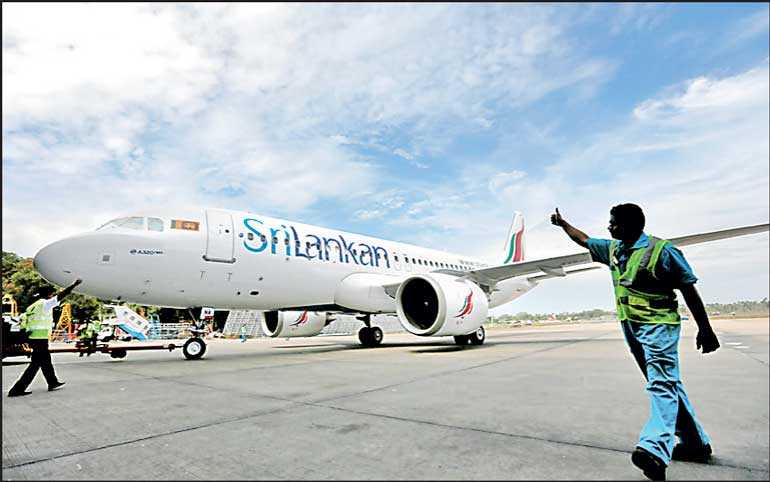Wednesday Feb 25, 2026
Wednesday Feb 25, 2026
Saturday, 3 August 2019 00:10 - - {{hitsCtrl.values.hits}}

By Charumini de Silva
The SLFP-linked trade union yesterday claimed that the national carrier will incur a loss of Rs. 175 million per month, as a result of the Government’s decision to reduce ground handling charges by 25% to woo international flights post-Easter Sunday setback.
Pointing out that ground handling is the most profitable division in the airline at present, they charged the intention of the Government in reducing service charges was to fast-track a nosedive for the already loss-making SriLankan Airlines.
SLFP...
“The management and the Prime Minister Ranil Wickremesinghe has sent a written directive to reduce ground handling charges by 25%. This move will result a loss of Rs.175 million to the Government coffers,” Sri Lanka Nidahas Sevaka Sangamaya (SLNSS) President Janaka Wijayapathiratne told journalists.
On 7 July, Cabinet gave approval for a slew of charges including ground handling, aviation fuel and embarkation levy to be reduced for six months, to assist the tourism industry to recover after the Easter Sunday attacks, which killed 250 people, including 50 tourists.
He said the ground handling department generates an income of over $100 million per year, and if the directive is implemented, the airline will incur a huge loss of revenue.
“It is clear that the Government’s decision is to cause a natural death for the company,” he claimed.
According to him, the Dubai airport charges $4,900 per hour for SriLankan Airlines, while SriLankan Airlines charges $4,000 per hour from Emirates Airlines. With the implementation of the new directive, Wijayapathiratne claims SriLankan Airlines will charge only $3,000 per hour from international flights coming to Colombo, which will result a sharp decline in their revenue.
SLNSS demanded that the Government disclose their intention in reducing ground handling charges and to whom they expect to give this concession.
“Government claims that many international airlines have stopped flying to Sri Lanka post-Easter Sunday attacks, and the decision to reduce ground handling charges was to encourage them to start operations again. We categorically want to let everyone know that all airlines that discontinued flights to Colombo has resumed operations as usual. Not a single airline has completely pulled back flying to Sri Lanka,” he added.
Wijayapathiratne stressed that the reduction in the tourist arrivals post-Easter Sunday terror attacks had nothing to do with the ground handling charges of SriLankan Airlines.
SLNSS Secretary General Hasantha Yasaratne claimed that the flights were coming to Sri Lanka with tourists and not because of ground handling charges.
He charged that the Government was eying on a new deal with a foreign airline.
Despite the SLNSS’s claims, the airline industry last month welcomed the reduction in ground handling charges, noting that the move will boost the business climate and tourist arrivals.
Emphasising the fact that Sri Lanka is comparatively very expensive in the region, both Board of Airline Representatives (BAR) and the Sri Lanka Association of Airline Representatives (SLAAR) said the move will reduce the overall cost of operation for the airlines, and will give some impetus for new airlines to look at coming to Sri Lanka.
In FY18, SriLankan Group’s loss was Rs. 18.5 billion, down from Rs. 28.3 billion. The airline’s loss was Rs. 17.2 billion, down from Rs. 28.9 billion in FY17.
Despite the challenging operating environment, the Group saw a 19.0% increase in revenue to Rs. 164.8 billion, largely attributable to the significant year-on-year growth of passenger numbers. This increase was however partially offset by the drop in revenue recorded from air terminal and other services. Similarly, the revenue of the Company rose by 19.3% to Rs. 161.6 billion, stemming from the significant increase in passenger demand and the growth in carriage of cargo.
The SriLankan Airport and Ground Services department achieved 13% and 21% growth in work volume and in net earnings respectively as against the last financial year.